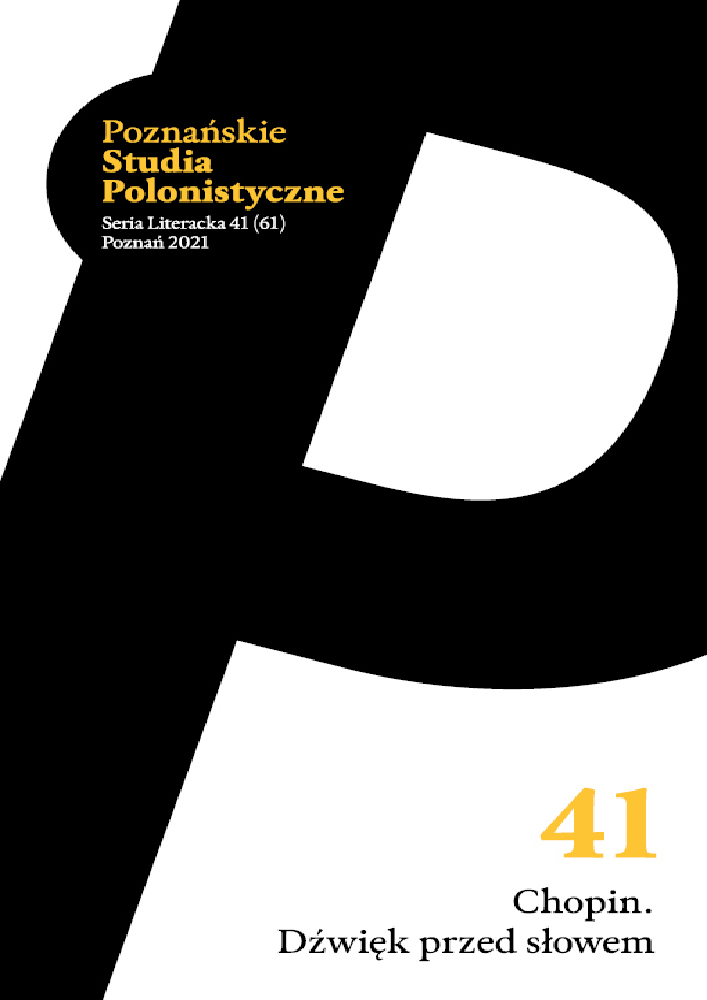Abstract
Why does André Gide so often compare Chopin to Baudelaire? For several reasons: because for him, the two artists are unique, irreplaceable, incomparable; because both were initially misunderstood; and because they are both classics of the nineteenth century. In other words, what distinguishes them, according to Gide, is their aesthetics of discretion, which is very
similar to the one he develops in his own works – particularly those in which he defends the homosexual cause.
References
Acquisto Joseph (2008), « La musique du désir et de la pureté. Gide face a Chopin et Baudelaire », Bulletin des Amis d’André Gide, no 157, janvier, p. 19-32.
Allégret Marc (1952), Avec André Gide, [film documentaire], [page consultée : le 29 octobre 2021], https://tinyurl.com/x3k7us4j.
Bertrand Stéphanie (2013), « “Je ne suis pas pareil aux autres” : le “je” gidien, entre désir de singularité et tentation de banalité », Bulletin des Amis d’André Gide, no 177-178, janvier, p. 133-143.
Bulletin des Amis d’André Gide (1986), no 71, juillet.
« Génie » (2020), [page consultée : le 18 décembre 2020], https://www.cnrtl.fr/definition/génie.
Gide André (1924a), Corydon, Gallimard, Paris.
Gide André (1924b), Incidences, Gallimard, Paris.
Gide André (1996), Journal, t. I : 1887-1925, Gallimard, Paris.
Gide André (1997), Journal, t. II : 1926-1950, Gallimard, Paris.
Gide André (1999), Essais critiques, Gallimard, Paris.
Gide André (2001), Si le grain ne meurt, in : Souvenirs et voyages, Gallimard, Paris.
Gide André (2010), Notes sur Chopin, Gallimard, Paris.
Gide André, Rosenberg Fédor (2021), Correspondance 1896-1934, éd. Nikol Dziub, Presses Universitaires de Lyon, Lyon.
Gide André, Rouveyre André (1967), Correspondance (1909-1951), éd. Claude Martin, Mercure de France, Paris.
Gide André, Simenon Georges (1999), Correspondance : 1938-1950, Omnibus, Paris.
Le Nouvel Observateur (2020), [page consultée : le 18 décembre 2020], https://tinyurl.com/ymjh7hjz.
Mann Thomas (1996), Le Docteur Faustus, traduit de l’allemand par Louise Servicen, in : Romans et nouvelles III, Le Livre de Poche, Paris, p. 317-903.
Moutote Daniel (1990), Réflexions sur « Les Faux-monnayeurs », Champion, Paris.
Moutote Daniel (1993), André Gide : esthétique de la création littéraire, Champion, Paris.
License
Authors
Authors of texts accepted for publication in „Poznańskie Studia Polonistyczne. Seria Literacka” are required to complete, sign and return to the editor's office the Agreement for granting a royalty-free license to works with a commitment to grant a CC sub-license.
Under the agreement, the authors of texts published in „Poznańskie Studia Polonistyczne. Seria Literacka” grant the Adam Mickiewicz University in Poznań a non-exclusive, royalty-free license and authorize the use of Attribution-NoDerivatives 4.0 International (CC BY-ND 4.0)Creative Commons sub-license.
The authors retain the right to continue the free disposal of the work.
Users
Interested Internet users are entitled to use works published in „Poznańskie Studia Polonistyczne. Seria Literacka” since 2016, for non-commercial purposes only, under the following conditions:
- attribution - obligation to provide, together with the distributed work, information about the authorship, title, source (link to the original work, DOI) and the license itself.
- no derivatives - the work must be preserved in its original form, without the author's consent it is not possible to distribute the modified work, such as translations, publications, etc.
Copyrights are reserved for all texts published before 2016.
Miscellaneous
Adam Mickiewicz University in Poznań retains the right to magazines as a whole (layout, graphic form, title, cover design, logo etc.).
